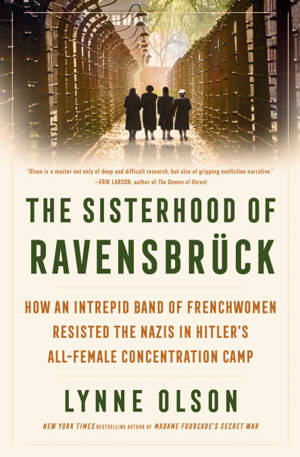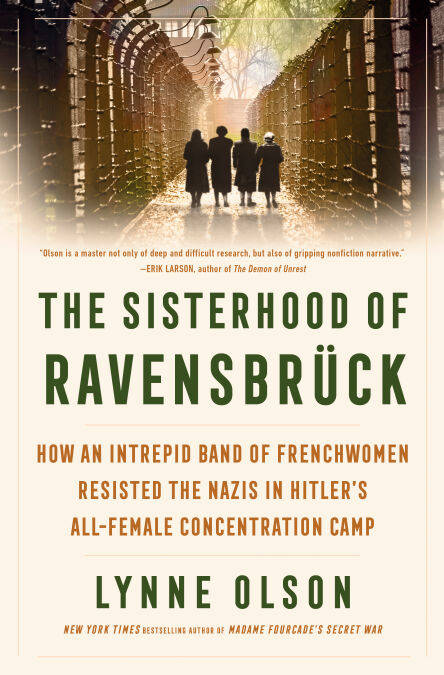
Bedankt voor het vertrouwen het afgelopen jaar! Om jou te bedanken bieden we GRATIS verzending (in België) aan op alles gedurende de hele maand januari.
- Afhalen na 1 uur in een winkel met voorraad
- In januari gratis thuislevering in België
- Ruim aanbod met 7 miljoen producten
Bedankt voor het vertrouwen het afgelopen jaar! Om jou te bedanken bieden we GRATIS verzending (in België) aan op alles gedurende de hele maand januari.
- Afhalen na 1 uur in een winkel met voorraad
- In januari gratis thuislevering in België
- Ruim aanbod met 7 miljoen producten
Zoeken
The Sisterhood of Ravensbrück E-BOOK
How an Intrepid Band of Frenchwomen Resisted the Nazis in Hitler's All-Female Concentration Camp
Lynne Olson
E-book | Engels
€ 17,34
+ 17 punten
Uitvoering
Omschrijving
The extraordinary true story of a small group of Frenchwomen, all Resistance members, who banded together in a notorious concentration camp to defy the Nazis—from the New York Times bestselling author of Madame Fourcade’s Secret War
“At once heartbreaking and beautifully told, this is a masterwork of nonfiction, a must-read for anyone who wants more of the incredible true story behind Lilac Girls.”—Martha Hall Kelly, author of Lilac Girls
ONE OF THE TOP TEN BOOKS OF JUNE—The Washington Post and Los Angeles Times
Decades after the end of World War II, the name Ravensbrück still evokes horror for those with knowledge of this infamous all-women’s concentration camp, better known since it became the setting of Martha Hall Kelly’s bestselling novel, Lilac Girls. Particularly shocking were the medical experiments performed on some of the inmates. Ravensbrück was atypical in other ways as well, not just as the only all-female German concentration camp, but because 80 percent of its inmates were political prisoners, among them a tight-knit group of women who had been active in the French Resistance.
Already well-practiced in sabotaging the Nazis in occupied France, these women joined forces to defy their German captors and keep one another alive. The sisterhood’s members, amid unimaginable terror and brutality, subverted Germany’s war effort by refusing to do assigned work. They risked death for any infraction, but that did not stop them from defying their SS tormentors at every turn—even staging a satirical musical revue about the horrors of the camp.
After the war, when many in France wanted to focus only on the future, the women from Ravensbrück refused to allow their achievements, needs, and sacrifices to be erased. They banded together once more, first to support one another in healing their bodies and minds and then to continue their crusade for freedom and justice—an effort that would have repercussions for their country and the world into the twenty-first century.
“At once heartbreaking and beautifully told, this is a masterwork of nonfiction, a must-read for anyone who wants more of the incredible true story behind Lilac Girls.”—Martha Hall Kelly, author of Lilac Girls
ONE OF THE TOP TEN BOOKS OF JUNE—The Washington Post and Los Angeles Times
Decades after the end of World War II, the name Ravensbrück still evokes horror for those with knowledge of this infamous all-women’s concentration camp, better known since it became the setting of Martha Hall Kelly’s bestselling novel, Lilac Girls. Particularly shocking were the medical experiments performed on some of the inmates. Ravensbrück was atypical in other ways as well, not just as the only all-female German concentration camp, but because 80 percent of its inmates were political prisoners, among them a tight-knit group of women who had been active in the French Resistance.
Already well-practiced in sabotaging the Nazis in occupied France, these women joined forces to defy their German captors and keep one another alive. The sisterhood’s members, amid unimaginable terror and brutality, subverted Germany’s war effort by refusing to do assigned work. They risked death for any infraction, but that did not stop them from defying their SS tormentors at every turn—even staging a satirical musical revue about the horrors of the camp.
After the war, when many in France wanted to focus only on the future, the women from Ravensbrück refused to allow their achievements, needs, and sacrifices to be erased. They banded together once more, first to support one another in healing their bodies and minds and then to continue their crusade for freedom and justice—an effort that would have repercussions for their country and the world into the twenty-first century.
Specificaties
Betrokkenen
- Auteur(s):
- Uitgeverij:
Inhoud
- Aantal bladzijden:
- 384
- Taal:
- Engels
Eigenschappen
- Productcode (EAN):
- 9780593732311
- Verschijningsdatum:
- 2/06/2025
- Uitvoering:
- E-book
- Beveiligd met:
- Adobe DRM
- Formaat:
- ePub

Alleen bij Standaard Boekhandel
+ 17 punten op je klantenkaart van Standaard Boekhandel
Beoordelingen
We publiceren alleen reviews die voldoen aan de voorwaarden voor reviews. Bekijk onze voorwaarden voor reviews.









